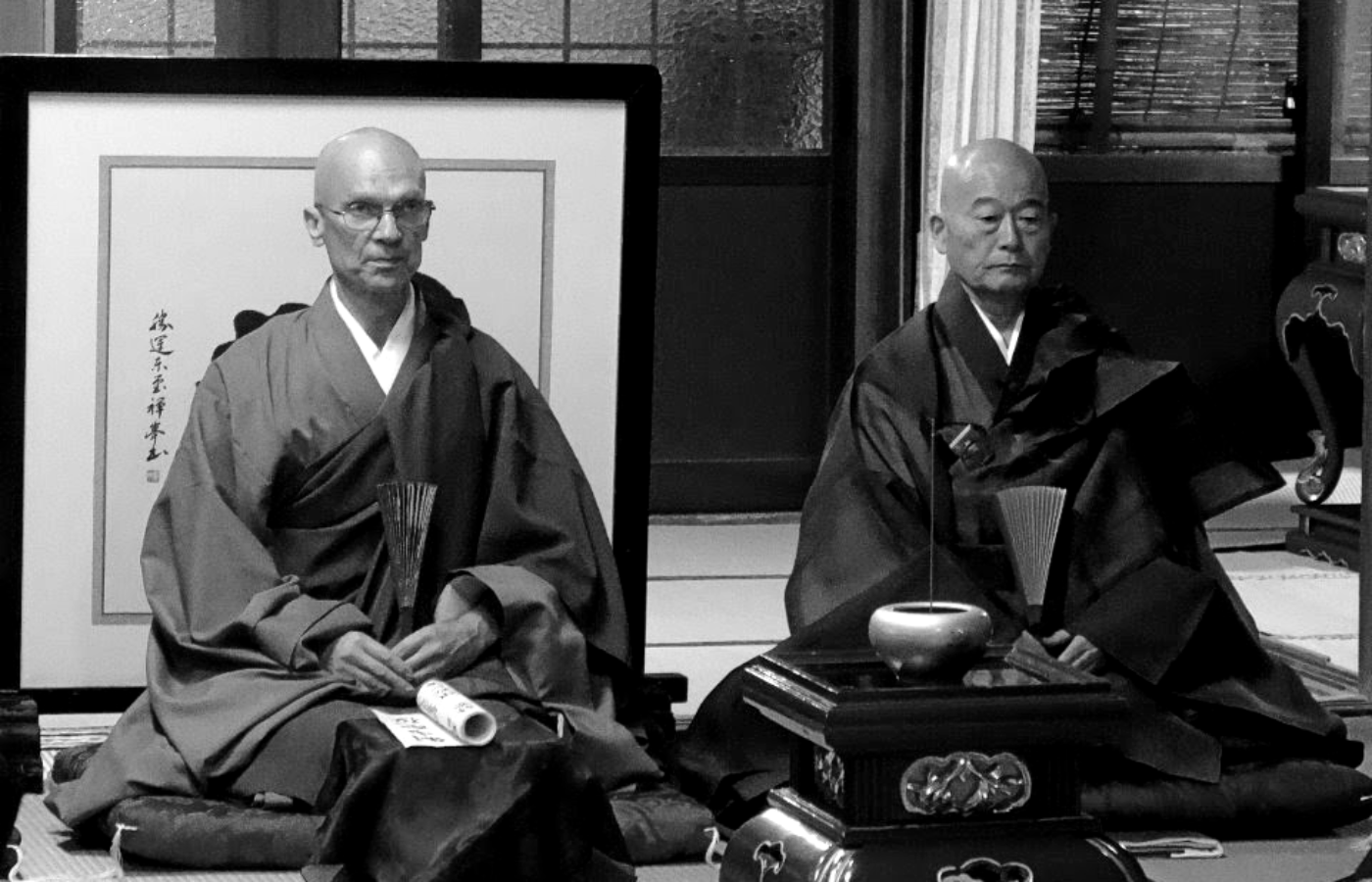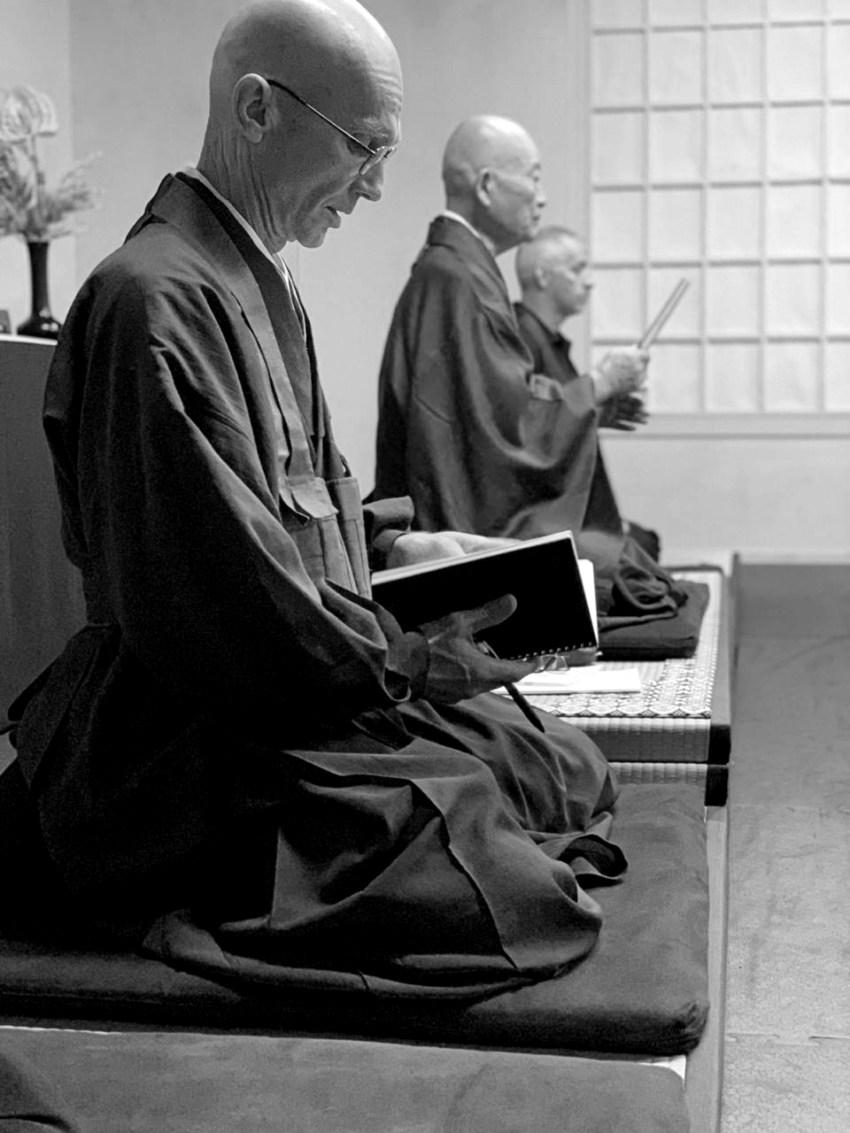QUESTIONS & ANSWERS WITH KOTEN ROSHI (PART 1)

Questions & Answers with Koten Roshi.
The translation from Japanese to English was conducted by Doiku Sensei.
The material below is extracted from Koten Roshi’s online dharma talks during Zen Center Athens’ Zen days. Effort and attention have been given in order to make it clear to the reader, without interfering with the meaning or the message.
Q: What is the difference between becoming one with the breath and shikantaza?
Koten Roshi: Shikantaza, or simply sitting, is the form of becoming one with your present reality. It is just a difference in words. When you become one with the breathing, you sit, you and the breathing alone. When things arise around you, you don’t pay attention, you don’t deal with them. You always keep your attention to breathing. You become one with breathing.
In shikantaza, you simply sit. In other words, you don’t attach to things that arise, you are not distracted by things that arise, whether things are “form” or “not form”. You simply sit. So, the content is quite similar. In the first one, the form is in front of you and you endeavour to close the gap between yourself and the breathing. In shikantaza, you simply sit and you become one with the present moment, the present reality.
Q: Is it possible to be functional in daily life without using memory? Is it possible, without using the mind, to label things? Can you have fast responses, keep yourself safe, as well as other things?
Koten Roshi: We will use the example of shikantaza. In shikantaza, everything just arises naturally, as it is. You are not dealing with it; you leave it alone. When, for example, you are cutting a tree, you endeavour to cut the tree. You are not worried about ideas regarding the self or other ideas. When you raise ideas regarding the self, they only become a hindrance to the work itself. If you don’t raise this idea of a self and just wholeheartedly endeavour in the thing itself just as it is, these ideas about good and bad, right and wrong, self and other, this kind of discriminating thoughts won’t enter, they won’t interfere with the work that is at hand.
In actuality, it’s the same thing as shikantaza. You don’t raise the idea of a self and you completely become one with the work itself as it is. To wholeheartedly endeavour when you’re sitting, you’re doing the breathing wholeheartedly, breathing just the breathing itself. If you’re doing some kind of a job or labour, you become one with just that labour itself.
Q: In the Heart Sutra, it says that “form is emptiness and emptiness is form”. With the word “form” does it describe this separate self that is already also emptiness? Do we have to find a balance and keep the middle way without deleting the form since it exists but knowing that it is empty when we see it?
Koten Roshi: “Form is emptiness, and emptiness is form”. Another way of saying this is: While things exist, they don’t exist. At the same time, while saying that things exist while they don’t exist, we don’t refer to the relative way of thinking about existing and non-existing. When all things become one, it’s impossible to say that they exist or don’t exist. It’s just things as they are. They rise due to circumstances, to cause and effect, at that moment. The next moment, it completely changes and things continue to change. So, because things continuously change, it’s impossible to perceive things as existing or non-existing. Things are changing themselves all the time.
Q: Do we have a personal Karma when we’re born?
Koten Roshi: This idea of personal Karma is used as an explanation. In Buddhism when we refer to Karma, we refer to cause and effect circumstances. Because there is no personal self, there is no place where personal Karma can attach to. There is no personal self, but for the matter of explanation, we use terms like Karma in order to explain Dharma.
When we are born there is no Karma. But then, as we gain things like consciousness, understanding, knowledge and conception, the idea or notion of Karma arises. When the perception of an ego-self disappears, and the event of dropping mind and body occurs, the perception of Karma also disappears.
Q: Can we say that our human Karma is linked to the fact that the human mind has a tendency towards duality?
Koten Roshi: It is because of the ego self that we perceive things like Karma. When the ego self disappears, then this perception of Karma will also disappear. Our present reality as it is, is Karma. But our present reality is not something that we are able to perceive or understand or grasp. It’s something that arises before our perception or consciousness of it arises.
Q: This personal Karma, however it arises, does it continue from lifetime to lifetime until we wake up?
Koten Roshi: Is there a life after this present one? Does it continue or doesn’t continue?
Q: There’s always a continuation, because of cause and effect. Whatever degree of awakening we have attained, does it continue from lifetime to lifetime?
Koten Roshi: The problem arises when we think there is a continuation. Everything is always constantly changing, but at the same time there is no beginning and there is no end. Although things are constantly changing, there is not something that is going through a change from one period to the next. There is no existence or reality that undergoes change. It is just the change itself that continues.
Q: If I understood correctly, Dharma nature is the nature of all manifested phenomena of all beings, and Buddha nature is the potential to go beyond manifested phenomena, to grasp reality. But then you said that Dharma nature and Buddha nature are equal. And that’s where I got confused.
Koten Roshi: In terms they are separated, but actually, they are one and the same. It is just like the sitting practice and the practice in motion. They are two forms or functions of the same reality.
Q: You said that through zazen we can attain peace of mind and freedom. I think I read that when we sit in zazen, the best thing we can do is try to not attain anything. So, is it right to sit trying to attain freedom and peace of mind?
Koten Roshi: It is not true that there is nothing to seek outside the present moment. To seek something is not a mistake. To seek peace of mind, to seek liberation is not a mistake. Without having a goal in mind, your practice will not move. It won’t go anywhere.
Q: If I understood correctly, you said that when we do zazen, it’s not bad to have goals unless they are specific goals. Is that correct?
Koten Roshi: Someone who hasn’t attained the way and hasn’t awakened to the true self cannot practice without a goal and a purpose. But someone who has attained the way and has gotten rid of the ego-self will say that there is nothing to seek, nothing to search for. It’s very important to know where in your practice you must make the effort.
There’s a concept or an idea that there is no purpose and nothing to seek in our practice. This is just a concept in the mind and something that arises out of thinking itself. We should keep in mind that, in our practice, the purpose is to forget the self. It is to drop off mind and body and to become one with our condition, exactly as it is, right now. This is what we seek in our practice. If you just have this conceptual understanding of no purpose, you remain in the realm of thinking and you have missed the point of zazen practice.

